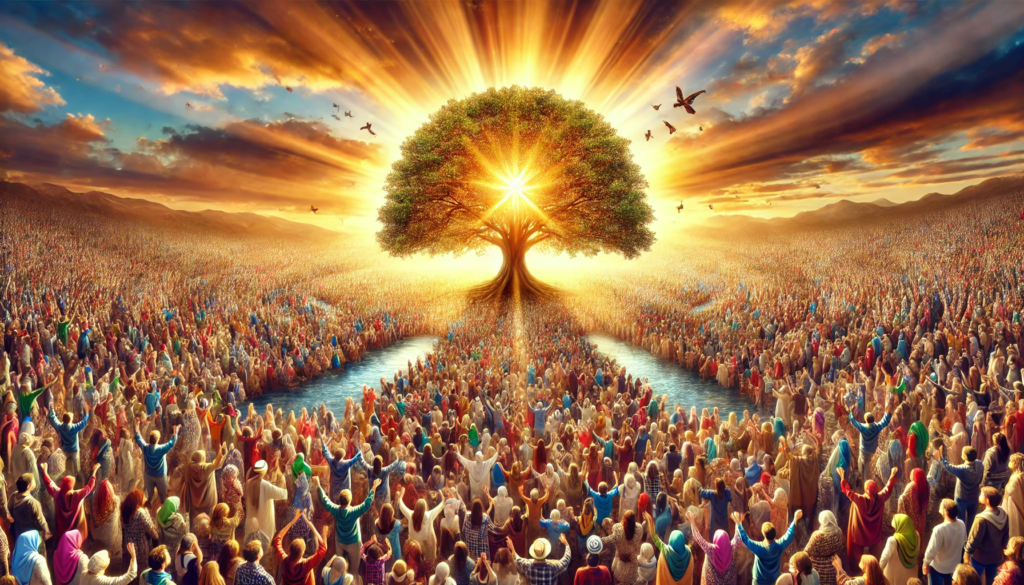
Exploring Universal Salvation: A Journey of Hope and Uncertainty
As much as I’d like to believe and I hope there is Universal Salvation for all people, I don’t yet know where I stand with it. The idea that all souls might eventually be reconciled to God is both comforting and challenging, inviting deep reflection and study. Many influential figures throughout Christian history have leaned towards Universalism, and various scriptures can be interpreted to support this hopeful theology.
Scriptural Support for Universal Salvation
- 1 Timothy 2:4 – “Who desires all men to be saved and to come to the knowledge of the truth.”
- This verse emphasizes God’s desire for the salvation of all humanity, suggesting a universal scope of God’s redemptive plan.
- This verse emphasizes God’s desire for the salvation of all humanity, suggesting a universal scope of God’s redemptive plan.
- 2 Peter 3:9 – “The Lord is not slack concerning His promise, as some count slackness, but is longsuffering toward us, not willing that any should perish but that all should come to repentance.”
- Here, God’s patience and will for repentance and salvation for everyone are highlighted, aligning with Universalist hopes.
- Here, God’s patience and will for repentance and salvation for everyone are highlighted, aligning with Universalist hopes.
- Colossians 1:19-20 –
“For it pleased the Father that in Him all the fullness should dwell, and by Him to reconcile all things to Himself, by Him, whether things on earth or things in heaven, having made peace through the blood of His cross.”
- These verses speak to the cosmic scope of Christ’s reconciliation, suggesting that all things in heaven and on earth will be brought back into harmony with God.
- These verses speak to the cosmic scope of Christ’s reconciliation, suggesting that all things in heaven and on earth will be brought back into harmony with God.
- II Peter 3:9
“The Lord is not slack concerning His promise, as some count slackness, but is longsuffering toward us, not willing that any should perish but that all should come to repentance.””For as in Adam all die, even so in Christ all shall be made alive.” - I John 2:2
“And He Himself is the propitiation for our sins, and not for ours only but also for the whole world.”
Universalist Leanings of Historical and Contemporary Figures and Groups
Early Church Fathers and Medieval Thinkers
- Gregory of Nyssa (c. 335–395)
- Gregory was a Cappadocian Father and an influential theologian. He argued for the eventual restoration of all things (apokatastasis), suggesting that all souls would eventually be purified and restored to God.
- Clement of Alexandria (c. 150–215)
- An early Christian theologian who saw God’s love as ultimately irresistible and transformative, hinting at a universal salvation through a purifying process.
- Origen of Alexandria (c. 185–254)
- Origen was an early Christian scholar and theologian who espoused the idea of apokatastasis, believing that all souls, even the devil, would eventually be restored to God after a period of purification.
- Julian of Norwich (1342–1416)
- An English mystic whose writings, particularly in her “Revelations of Divine Love,” expressed a hopeful vision of universal salvation, encapsulated in her famous phrase, “All shall be well.”
Protestant Reformers and Theologians
- Quakers
- The Religious Society of Friends, known for their emphasis on the inner light and direct experience of God, has had members and thinkers who leaned towards Universalism, emphasizing God’s love for all humanity.
- Moravians
- This Protestant denomination, known for their missionary work and communal living, included individuals with Universalist tendencies, focusing on God’s redemptive plan for all.
- George Whitefield (1714–1770)
- An influential preacher in the Great Awakening, Whitefield had complex views, but his emphasis on God’s boundless grace led some to interpret his theology as having Universalist implications.
19th and 20th Century Theologians and Writers
- George MacDonald (1824–1905)
- A Scottish author and minister, MacDonald was a strong proponent of Universalism, often weaving themes of ultimate redemption and divine love into his writings.
- William Barclay (1907–1978)
- A Scottish minister and professor, Barclay openly expressed his belief in Universalism, arguing that God’s love is ultimately irresistible.
- Madeleine L’Engle (1918–2007)
- An American author, best known for “A Wrinkle in Time,” L’Engle’s writings often reflected a hopeful Universalist theology, emphasizing God’s inclusive love.
- Jurgen Moltmann (b. 1926)
- A German Reformed theologian, Moltmann’s theology of hope includes a vision of universal reconciliation, emphasizing God’s ultimate victory over all evil.
Conclusion
Universal Salvation is a profound and hopeful concept that has resonated with many throughout Christian history. While I am still exploring where I stand on this belief, it’s evident that the scriptural support and theological reflections of numerous influential figures provide a somewhat compelling case for the ultimate reconciliation of all souls to God.
This journey invites continued study, reflection, and, above all, hope in the boundless love and mercy of God.


